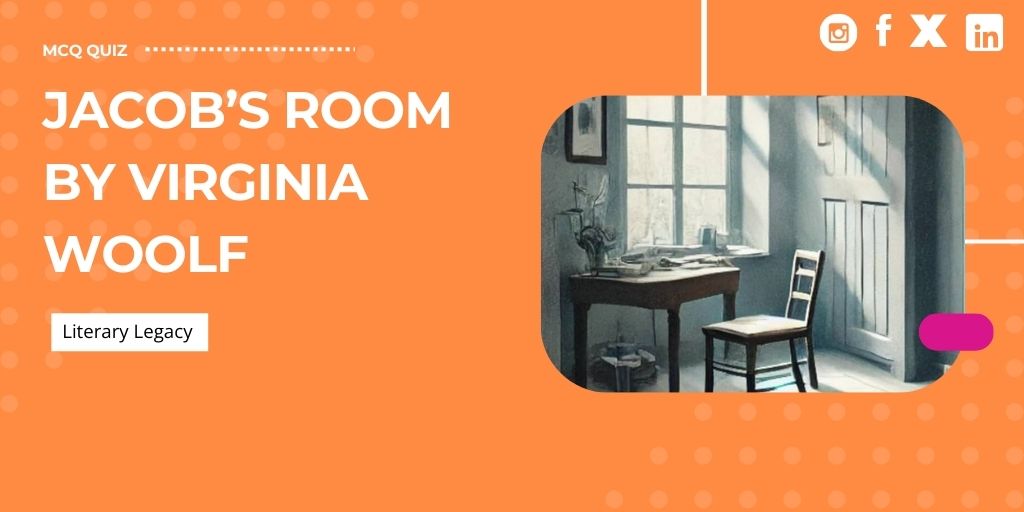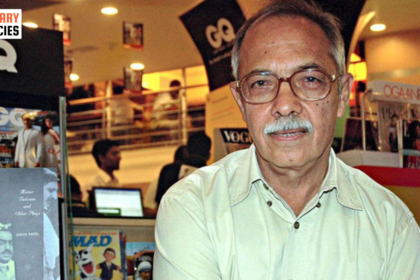1. What distraction causes Jacob to leave the crab he found in the rockpool?
Choices
A) A couple laying together on the beach
B) His mother’s call for dinner
C) A seagull flying overhead
D) The sound of other children playing
Answer: (A)
A couple laying together on the beach
Jacob’s curiosity about the couple distracts him from the crab.
2. How does Betty Flanders perceive her son Jacob?
Choices
A) As a quiet observer
B) As a handful
C) As a responsible young boy
D) As an independent child
Answer: (B)
As a handful
Betty describes Jacob as a ‘handful,’ indicating her perception of his behavior.
3. What does Jacob find and cradle in his arms beneath a tree?
Choices
A) A baby bird
B) A stone
C) A broken toy
D) A sheep’s skull
Answer: (D)
A sheep’s skull
Jacob finds and cradles a sheep’s skull, showing his curiosity.
4. What role does Archer attempt to assume after their father’s death?
Choices
A) A makeshift father figure
B) A carefree child
C) A rebellious teenager
D) A distant observer
Answer: (A)
A makeshift father figure
Archer tries to fill the void left by his father by taking on responsibility.
5. What keeps Archer from sleeping at the lodging house?
Choices
A) The noise from the storm outside
B) The sounds of the lodging house
C) Worries about his mother’s wellbeing
D) The fear of darkness
Answer: (B)
The sounds of the lodging house
Archer is disturbed by the sounds around the lodging house.
6. Who is responsible for watching over the baby while the children sleep?
Choices
A) Rebecca
B) Archer Flanders
C) Jacob Flanders
D) Betty Flanders
Answer: (A)
Rebecca
Rebecca takes on the role of watching over the baby.
7. What has Betty forgotten to buy before returning to the lodging home?
Choices
A) Bread
B) Vegetables
C) Candy for the children
D) Meat
Answer: (D)
Meat
Betty realizes she has forgotten to buy meat on their way back.
8. How is the children’s grief portrayed in the narrative?
Choices
A) By their excessive celebrations
B) Through the absence of a father figure
C) Through their playful behavior
D) By their indifference to their surroundings
Answer: (B)
Through the absence of a father figure
The grief of the children is conveyed through the absence of their father.
9. What object is notably placed at the foot of Jacob’s bed?
Choices
A) The sheep’s jawbone
B) A picture of their father
C) A toy
D) A book
Answer: (A)
The sheep’s jawbone
The sheep’s jawbone is mentioned as being at the foot of Jacob’s bed.
10. What emotion does Betty primarily express in her letter to Captain Barfoot?
Choices
A) Joy
B) Anger
C) Grief
D) Confusion
Answer: (C)
Grief
Betty’s letter is described as ‘tear-stained,’ indicating her grief.
11. What object represents Jacob’s connection to his father and his personal grief in the narrative?
Choices
A) The bucket
B) The crab
C) The love letter from Mr. Lloyd
D) The ram’s skull
Answer: (D)
The ram’s skull
The ram’s skull symbolizes death and Jacob’s clinging to the memory of his father.
12. How does Jacob feel about the crab he traps in the bucket?
Choices
A) He uses it as a trophy.
B) He forgets about it completely.
C) He learns a lot from observing it.
D) He becomes emotionally attached to it.
Answer: (B)
He forgets about it completely.
Jacob forgets about the crab after trapping it, demonstrating his flawed act of observation.
13. Which character visited Betty regularly after her husband’s death?
Choices
A) Andrew Lloyd
B) Richard Bonamy
C) Captain Barfoot
D) Timothy Durrant
Answer: (C)
Captain Barfoot
Captain Barfoot is the character who regularly visits Betty after the death of her husband.
14. In which university does Jacob study literature?
Choices
A) London School of Economics
B) Harvard University
C) Oxford University
D) University of Cambridge
Answer: (D)
University of Cambridge
Jacob studies literature at the University of Cambridge during his college years.
15. What is Jacob’s reaction to his mother’s love letter from Andrew Lloyd?
Choices
A) He encourages her to accept the proposal.
B) He disapproves and urges her to reject it.
C) He is indifferent to her feelings.
D) He supports her decision.
Answer: (B)
He disapproves and urges her to reject it.
Betty rejects Andrew Lloyd’s advances as she is still mourning her husband’s death.
16. What prompts Jacob to travel to Greece?
Choices
A) A job offer.
B) His pursuit of ancient Greek art and literature.
C) To escape his life in London.
D) A scholarship opportunity.
Answer: (B)
His pursuit of ancient Greek art and literature.
Jacob is drawn to Greece due to his admiration for ancient Greek art and literature.
17. Which female character attempts to connect with Jacob through reading his favorite books?
Choices
A) Florinda
B) Fanny Elmer
C) Clara Durrant
D) Betty Flanders
Answer: (B)
Fanny Elmer
Fanny Elmer attempts to get closer to Jacob by engaging with his favorite literature.
18. What emotional state does Jacob experience after returning to London from Greece?
Choices
A) Joyful and optimistic.
B) Fulfilled and satisfied.
C) Determined and ambitious.
D) Lovesick and alienated.
Answer: (D)
Lovesick and alienated.
Upon returning to London, Jacob feels lovesick over Sandra and experiences feelings of alienation and purposelessness.
19. What is the significance of Jacob’s relationship with Florinda?
Choices
A) It showcases his desire for stability.
B) It symbolizes his independence from his family.
C) It reflects the disparity between their backgrounds.
D) It is a purely platonic relationship.
Answer: (C)
It reflects the disparity between their backgrounds.
Jacob’s relationship with Florinda highlights the contrast between their different socio-economic backgrounds.
20. At what age does Jacob embark on his first trip abroad?
Choices
A) Twenty-two
B) Twenty-six
C) Twenty-five
D) Twenty
Answer: (B)
Twenty-six
Jacob sets off on his first trip abroad at the age of twenty-six.
21. What does Jacob hope to achieve by studying the crab he traps in the bucket?
Choices
A) To contemplate the concept of inescapability.
B) To draw inspiration for his literature studies.
C) To learn about marine life.
D) To understand the nature of observation.
Answer: (D)
To understand the nature of observation.
Jacob’s flawed act of observation reveals more about him than about the crab itself.
22. Which object symbolizes Jacob’s memories of his father?
Choices
A) The ram’s skull.
B) The letters from his friends.
C) The books he reads at the British Museum.
D) The crab in the bucket.
Answer: (A)
The ram’s skull.
The ram’s skull represents death and Jacob’s connection to the memory of his father.
23. What theme is primarily explored through Jacob’s relationship with his mother?
Choices
A) The consequences of widowhood and grief.
B) The conflict of love and friendship.
C) The pursuit of knowledge over emotional connection.
D) The impact of war on family dynamics.
Answer: (A)
The consequences of widowhood and grief.
Betty’s grief over her husband’s death influences her relationship with her sons.
24. How does Jacob’s upbringing compare to that of his friends at university?
Choices
A) It is more urban and sophisticated.
B) It is more rural and humble.
C) It is more academically focused.
D) It is lesser in financial stability.
Answer: (B)
It is more rural and humble.
Jacob’s rural upbringing sets him apart from his wealthier friends at Cambridge.
25. What motivates Jacob to study ancient Greek literature and art?
Choices
A) Fatigue with modern life.
B) A desire to become a teacher.
C) Inspiration from his friends’ achievements.
D) An attraction to historical narratives.
Answer: (A)
Fatigue with modern life.
Jacob seeks refuge from modern life and finds solace in ancient Greek culture.
26. Which character complicates Jacob’s emotional state during his time in Greece?
Choices
A) Elizabeth Flanders.
B) Clara Durrant.
C) Florinda.
D) Sandra Wentworth Williams.
Answer: (D)
Sandra Wentworth Williams.
Jacob becomes frustrated by his attraction to the married Sandra, distracting him from his pursuits.
27. What is a significant action that represents Jacob’s unresolved grief?
Choices
A) Clinging to the ram’s skull.
B) His choice to explore ancient ruins.
C) His decision to leave London.
D) Failing to return to Cambridge.
Answer: (A)
Clinging to the ram’s skull.
Jacob’s attachment to the ram’s skull symbolizes his unresolved feelings about his father’s death.
28. What relationship dynamic is ambiguous between Betty and Captain Barfoot?
Choices
A) A tension between family and friendship.
B) A potential courtship amidst grief.
C) Them being childhood friends turned lovers.
D) A mentor-student relationship.
Answer: (B)
A potential courtship amidst grief.
The unclear relationship suggests the possibility of romantic interest amid Betty’s widowhood.
29. What is Jacob’s emotional state after returning from Europe?
Choices
A) Upliftment from his cultural experiences.
B) Excitement about potential career opportunities.
C) Alienation and a lack of direction.
D) Contentment with his romantic life.
Answer: (C)
Alienation and a lack of direction.
Jacob feels increasingly lovesick and purposeless upon arriving back in London.
30. What illustrates the linear nature of Jacob’s life experiences throughout the novel?
Choices
A) The contrast between his past and future aspirations.
B) His gradual progression from childhood to adulthood.
C) The influence of his friends on his decisions.
D) The changes in his emotional landscape over time.
Answer: (B)
His gradual progression from childhood to adulthood.
The narrative follows Jacob from his childhood through various stages of his life.
31. What is the primary setting for Betty Flanders while she writes her letter to Captain Barfoot?
Choices
A) A forest retreat
B) A quiet beach
C) A bustling market
D) An urban apartment
Answer: (B)
A quiet beach
Betty Flanders is on vacation in Cornwall, which is characterized by its beach setting.
32. Which of the following best describes the relationship between Archer and Jacob Flanders after their father’s death?
Choices
A) Sibling rivalry for their mother’s affection
B) Jacob resents Archer for taking charge
C) They are indifferent to each other’s struggles
D) Archer assumes a fatherly role for Jacob
Answer: (D)
Archer assumes a fatherly role for Jacob
Archer tries to fill the void left by their father’s death, stepping up as a makeshift father figure.
33. How does Betty’s emotional state influence her actions during the beach vacation?
Choices
A) She is preoccupied and forgetful.
B) She becomes more social and outgoing.
C) She quickly makes new friends.
D) She enjoys the beaches and forgets her grief.
Answer: (A)
She is preoccupied and forgetful.
Betty is shown to be preoccupied with her grief, leading her to forget important tasks like buying meat.
34. What does the character Jacob engage with that symbolizes his curiosity and innocence?
Choices
A) Capturing a bird in the sky.
B) Finding a crab in a rockpool.
C) Building a sandcastle.
D) Drawing in the sand with a stick.
Answer: (B)
Finding a crab in a rockpool.
Jacob’s exploration of nature, such as finding a crab, showcases his youthful curiosity.
35. What object indicates Jacob’s playful yet morbid curiosity beneath the tree?
Choices
A) A seashell.
B) A rusted piece of metal.
C) A lost toy.
D) A sheep’s skull.
Answer: (D)
A sheep’s skull.
Jacob cradles a sheep’s skull, reflecting a blend of innocence and an unusual fascination.
36. What impact does Seabrook Flanders’s death have on the Flanders family dynamics?
Choices
A) Archer becomes resentful towards his mother.
B) It creates tension and conflict among the children.
C) It allows the family to bond closer together.
D) Jacob celebrates his father’s achievements.
Answer: (B)
It creates tension and conflict among the children.
The absence of the father figure leads to shifts in responsibilities and emotions within the family.
37. What does Jacob’s act of carrying the jawbone home suggest about his character?
Choices
A) He reflects a deeper understanding of loss.
B) He is afraid of the dark.
C) He is unaware of its significance.
D) He seeks attention from his mother.
Answer: (A)
He reflects a deeper understanding of loss.
Carrying the jawbone symbolizes Jacob’s relationship with death and his father’s absence.
38. What aspect of Betty Flanders’s character is highlighted through her interactions with Jacob during their vacation?
Choices
A) Her strict parenting style.
B) Her struggles with grief and care for her children.
C) Her desire to travel without children.
D) Her growing independence.
Answer: (B)
Her struggles with grief and care for her children.
Betty’s interactions with her children reflect her ongoing struggle with grief and responsibility.
39. What narrative technique is used to present Jacob Flanders’s character indirectly in the story?
Choices
A) Monologue
B) Perspective shifts through other characters
C) Flashback
D) Direct dialogue
Answer: (B)
Perspective shifts through other characters
Jacob’s character is revealed through the feelings and actions of other characters, primarily his mother.
40. What is a prominent theme that can be deduced from the children’s interactions and behaviors throughout the chapter?
Choices
A) The joy of family vacations.
B) The competitiveness among siblings.
C) Childhood innocence devoid of adult concerns.
D) The struggle of adapting to loss and grief.
Answer: (D)
The struggle of adapting to loss and grief.
The children’s actions demonstrate their coping mechanisms and struggles following their father’s death.



